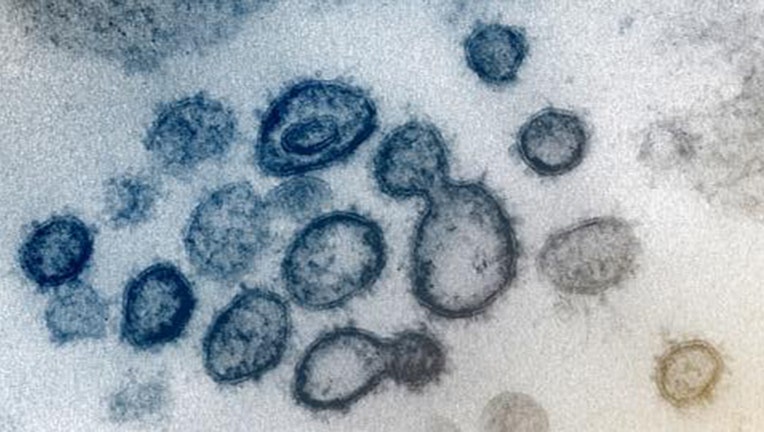Idaho doctors warn that rationed care looms as virus spreads

A transmission electron microscope image shows SARS-CoV-2, also known as the 2019 novel coronavirus. (NIAID-RML)
BOISE, Idaho - Doctors serving Idaho and eastern Oregon spent hours Tuesday trying to sway health districts, city leaders and the public to do more to stop the spread of coronavirus, warning that rationed care is looming in Idaho's future.
But in one public health department, they were met with debunked conspiracy theories and skepticism.
It all came on a day when the state saw a record-high number of new coronavirus cases and new COVID-19 deaths, according to the Idaho Department of Health and Welfare: Thirty-five people died of COVID-19 on Tuesday, and 1,781 new cases were reported.
Idaho is experiencing severe and unchecked community spread of COVID-19 in much of the state, with more than 85,000 cases statewide and a positivity rate that has increased by nearly 42% in the past two weeks. There were nearly 1,000 new cases reported for every 100,000 residents in the past two weeks, according to numbers from Johns Hopkins University.
Unless the community “radically changes,” the number of COVID patients in southwestern Idaho hospitals will double by Christmas and triple by mid-January, Dr. Steven Nemerson with Saint Alphonsus Health Center told Boise Mayor Lauren McLean during a briefing Tuesday morning. The hospital system uses predictive modeling to determine how many coronavirus cases will likely come in the weeks ahead.
“And that's when we begin to take care of patients in areas of the building that are not used for traditional care — things like conference rooms,” Nemerson said.
The modeling systems use regional testing numbers and other data to predict how many COVID-19 patients will need to be hospitalized. It has been highly accurate so far, Nemerson said, but it doesn't account for Thanksgiving get-togethers or holiday traveling. That could increase numbers dramatically, if the spikes seen in Idaho after the 4th of July holiday weekend are any indication.
“We're very, very concerned about the upcoming holidays, both Thanksgiving and Christmas. One family getting together with another family is a very common spreader-event opportunity," he said. "Christmas and Thanksgiving gatherings that we love to have, they really need to not happen this year.”
While Nemerson and other healthcare leaders were meeting with the Boise mayor, members of the Southwest Public Health District board were meeting in neighboring Canyon County. The district, which oversees one of the most populated regions in the state, has resisted mask mandates and other steps other regions have taken to slow the spread of the virus.
Board members invited speakers to talk about the impact of coronavirus, including some who promoted debunked conspiracy theories denying the existence or severity of COVID-19. Others also claimed wireless internet plays a role in the spread of the disease. Board members also heard from doctors who attempted to counter the misinformation and urged people to wear masks and take other steps to protect themselves and others from illness.
Seeing the level of community spread in Idaho is “like watching a passenger train derail,” said Dr. Sky Blue, an infectious disease specialist who works with several area hospitals. He urged attendees to follow the Biblical principle of “love your neighbors as yourselves."
“We're at a tipping point — the momentum of this spreading infection is like that train, and right now, our behavior is the only thing we have right now to change this trajectory,” Blue said.
After the board meeting, other area physicians expressed frustration that public health officials were amplifying conspiracy theories by giving COVID-deniers a platform. Dr. Jim Souza, the chief medical officer for St. Luke's Health System, called it a “toxic minority narrative.”
“At the end of the day it's not going to be OK to have a debate about whether the sky is blue or green,” said Souza, noting that Idaho hospitals are full of people suffering from COVID-19. “The solutions are simple — they're not an invasion of freedom, and at worse they're an inconvenience. It's time for the quiet majority to take back this conversation.”
Several doctors warned Tuesday afternoon that hospitals are nearing the point where they may have to enact crisis standards of care, unable to treat everyone because there aren't enough beds or staffers to go around.
Dr. Terry O'Conner, an emergency physician with St. Luke's-Wood River, said even the services hospitals use to transfer patients from one overcrowded facility to another with room are beginning to struggle to keep up with demand.
Weiser Memorial Hospital, meanwhile, is about to run out of rapid coronavirus tests, said Dr. Jordan Blanchard, the medical director. West Valley Medical Center in Caldwell has six ventilators, and five are currently full, said Dr. Richard Augustus.
“The patients we have are staying longer, and they're sicker, and we're going to have to make difficult decisions very soon about how we care for those patients,” Augustus said.
Dr. William Vetter, who runs Valor Health in Emmett, said rural hospitals like his won't have many options if the case numbers continue surge.
"And it kind of sucks. I’m sure the bigger hospitals have protocols on, ‘If we have two people that need the ventilator, who is going to get it,’ but from a rural perspective we don’t get those options,” he said. “It's, ‘I’m sorry, the line is full, you don’t get it.’ So whatever life-saving treatment you need, whether it’s delivering a baby via C-section or a heart attack, ventilator, whatever — you’re not going to get it.”

